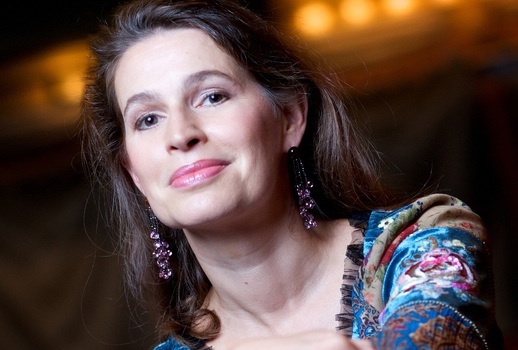
But that’s not all—I told you this was a substantial programme. Richard Strauss’ songs are, like Paris, (nearly) always a good idea, and Denoke was particularly effective in “Geduld.” which shimmers with l’impatience amoureuse, as the programme notes put it. Other Brahms pieces—such as Wie bist du meine Königin (How blissful you are, my queen) reminded us that this moody composer also had a licht side.
Denoke seemed quite calm and relaxed—and efficient, too, never basking in the hearty applause. My first exposure to this singer was last year as Kundry in Parsifal at the Royal Opera House, a gripping production that seemed quite physically demanding for Denoke. Thus this was an interesting opportunity to see her scale things way, way down. And the glorious Lieder on the programme was well served as a result. (Yet I must admit I was so envious of my Parisian classmate who joined me for the recital; he speaks fluent German and understood almost every word!).
Denoke was joined by German pianist Karola Theill, who has the great fortune of being able to write on her CV that she once accompanied the late Dietrich Fischer-Dieskau. She was a highly sensitive accompanist with a clear understanding of this music, though I found she tended to fade behind Denoke whereas some of my favourite lieder experiences have involved singer and pianist working as equal partners.
The recital was entitled, “Bist du bei mir” (Be, thou, with me), the name of an aria by Stölzel that was long misattributed to Bach. Indeed, we were with her.

(French moment: The head of the organization spoke for so long at the beginning of the performance—“Je voudrais remercier tous et toutes…”—that sniping audience members in the balconies starting jeering each time he said “Enfin…”)
And one other anecdote: I have learned by now that the good people at the Théâtre des Champs-Elysées do not mind when those with the cheap seats (like me) try to find another empty, better seat just before the show. I may have been a bit ambitious this time, as I sat in a perfectly located seat at the side of the Corbeille only to be told, “Vous n’êtes le directeur.” (Oops—I sat in the GM’s place…) Not to worry, I quickly relocated to the back of a front-and-centre box, quickly finding out I was joining one of the main sponsors of the concert and his superbly dressed sons. And then there’s me with my khakis and stuffed backpack….
But back to the music. This event was intended to pair two of the most esteemed French singers of the day, Sophie Koch—known for her portrayal of Charlotte opposite Jonas Kaufmann’s Werther—and static yet creamy baritone Ludovic Tézier. But alas, Tézier cancelled just over a week prior to the show due to illness, and Koch (as Cléopâtre) was left without her warrior Marc-Antoine. And Marc-Antoine is one long role with highly demanding tessitura.
Baritone Frédéric Goncalves came in and saved the day, apparently learning the role in only a few weeks. He had an unparalleled coach in Michel Plasson, the beloved octogenarian conductor who led his Orchestre Symphonique de Mulhouse and the Chœur de l’Orchestre de Paris in a polished if tentative performance. (Perhaps there were too few tutti rehearsals?) Mr. Plasson is closely identified with the operas of Massenet and he elevated this evening from a ‘mixed bag’ to a memorable artistic experience.
Though there was nothing tentative in Mr. Goncalves—just a lot of colourless belting, but at least he hit the notes and projected well. Were it not for the orchestra, and Massenet’s evocative orchestrations, we would have had a difficult time identifying Marc-Antoine’s emotional trajectory. I spoke with a woman at intermission who called the baritone’s performance “une catastrophe,” but clearly that is too harsh. Pro bono and last minute, after all…
Luckily Ms. Koch was in radiant form, offering a portrayal of Cléopâtre that balanced regal stature with emotional volatility. She has a voice of considerable warmth with plush velvet sound, ideal for this repertoire. She is also probably one of the only living singers with experience in the role, having scored a success in Salzburg in 2012. For me, Koch’s most memorable line was when, in a moment of vulnerability she pulled herself together and told the commonfolk to “Recognize your Queen.”
The biggest delight of the evening came from—and the biggest ovations, save for Maestro Plasson, went to—tenor Benjamin Bernheim as Spakos, a slave who finds himself in a painfully brief, and ultimately fatal relationship with Cléopâtre. From his very first note Bernheim sang ardently with pristine legato, never venturing into the nasality we too often have to endure with tenors in French opera. He is one to watch.
I very much enjoyed this opportunity to hear Koch and Plasson lead this rare Massenet opera, and I am pleased that the performance will significantly support the work of Action Enfance. Yet the elements—orchestra, soloists, chorus, conductor—did not coalesce as fans of Massenet might have hoped.


